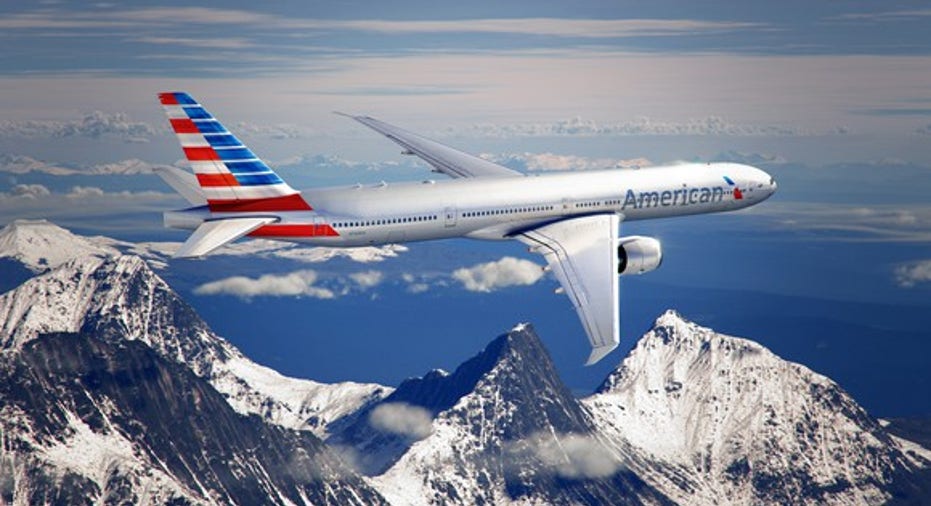Why American Airlines Stock Slumped on Thursday

Shares of American Airlines (NASDAQ: AAL) fell more than 5% on Thursday, even though the company reported earnings per share that beat analysts' estimates. The company's guidance for the second quarter was slightly better than what analysts had expected, as well.
However, a solid earnings report couldn't make up for American's announcement on Wednesday that it plans to give big mid-contract raises to its pilots (and to a lesser extent, its flight attendants). This raised the specter of further cost inflation for a company where costs are already somewhat out of control.
Another round of raises
Due to new labor contracts that have gone into effect at Delta Air Lines (NYSE: DAL) and United Continental recently, American Airlines' pilots and flight attendants currently have lower wage rates than their peers. They also receive lower profit-sharing payouts, particularly compared to Delta's pilots.
The American Airlines pilots' and flight attendants' contracts run until around the end of 2019. On the one hand, this means that American has a built in cost advantage over its rivals for now. But on the flip side, it faces a big future step-up in costs around 2020 -- and would have to deal with a lot of unhappy employees between now and then.
Some American Airlines labor groups have below-market wages today. Image source: American Airlines.
This is an untenable situation. As a result, American Airlines wants to bring its pilots' and flight attendants' wages up to the new industry standard as early as next month. That will require an 8% raise for the pilots and a 5% raise for the flight attendants.
American Airlines isn't asking for any concessions from its labor groups in exchange for these raises, so they will probably be implemented quickly. This will add about $230 million of costs this year and $350 million a year in 2018 and 2019.
A necessary but expensive move
Wall Street analysts criticized American's move to voluntarily boost employees' pay outside of the usual contract negotiation setting. The alternative was even worse, though, as it risked lasting damage to the company's labor relations for the sake of temporary cost savings.
Nevertheless, investors' frustration is very understandable. American Airlines generated about $40 billion of revenue last year, so a $350 million increase in annual costs will reduce its pre-tax margin by nearly a full percentage point.
This is worrisome, given that American's profit margin already lags that of industry-leader Delta Air Lines. In the first quarter, Delta made almost twice as much money as American Airlines. Meanwhile, for the second quarter, Delta's pre-tax margin is on pace to be about 5 percentage points higher than American's, based on the two companies' current outlooks.
Delta Air Lines has a big margin advantage over American Airlines. Image source: Delta Air Lines.
Furthermore, American Airlines is facing significant margin pressure due to rising fuel costs, as well as its labor cost inflation. In Q1, its adjusted pre-tax margin plunged to 5.1% from 12.9% a year earlier. For Q2, it expects to produce a pre-tax margin of 11%-13%, down from 15.4% in Q2 2016 and 17.2% in Q2 2015.
Thus, it's reasonable to wonder if cost inflation will hurt American Airlines' profitability significantly. The company already lags Delta in terms of margin performance despite paying lower wages -- bringing wages up to industry standards could just widen the margin gap.
Unit revenue growth may be the only solution
American Airlines' management has said in the past that non-fuel cost pressures will finally start to abate in 2018. Nevertheless, to meet CEO Doug Parker's goal of having industry-leading margins, American will need to significantly increase its unit revenue in the coming years.
Right now, it's on track in that respect. The company returned to unit revenue growth in late 2016, and American Airlines expects to produce a solid 3%-5% increase in revenue per available seat mile this quarter. But until the company shows that this kind of unit revenue growth is sustainable, American Airlines stock is likely to stay grounded.
10 stocks we like better than American Airlines GroupWhen investing geniuses David and Tom Gardner have a stock tip, it can pay to listen. After all, the newsletter they have run for over a decade, Motley Fool Stock Advisor, has tripled the market.*
David and Tom just revealed what they believe are the 10 best stocks for investors to buy right now... and American Airlines Group wasn't one of them! That's right -- they think these 10 stocks are even better buys.
Click here to learn about these picks!
*Stock Advisor returns as of April 3, 2017
Adam Levine-Weinberg owns shares of Delta Air Lines. The Motley Fool has no position in any of the stocks mentioned. The Motley Fool has a disclosure policy.



















